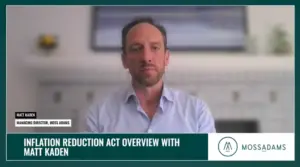Fairness and Solvency Opinion Topics within the Restructuring Wave
James Hanson, Managing Director at Opportune Partners LLC, an independent investment banking and financial advisory affiliate of Opportune LLP, is surprised by the number of people who haven’t heard of fairness and solvency opinions, considering their importance in protecting companies making business transactions. With fairness and solvency opinions becoming more and more a focus during the recent wave of bankruptcies and restructuring events, especially in the energy industry, Hanson joins E2B to share his wealth of experience to break down these important topics.
As oil and gas bankruptcies mount, the use of fairness and solvency opinions will be crucial for transactions in today’s environment.
Hanson explains the use of fairness opinions in simple terms: “A fairness opinion is a legal document usually provided to a board, or a special committee of a company, by an independent, third-party advisor (typically a financial advisory firm) that states that the valuation of a transaction is fair from a financial point-of-view.”
Fairness opinions are essential to protecting management teams and board of directors of a company. These opinions ensure that the transaction, large or small, is conducted in good faith and due care and help to avoid legal issues for a Board down the road. “Pretty much since 1985, every marquee transaction a business made has gotten a fairness opinion,” Hanson says.
Solvency opinions, meanwhile, are even lesser known than its fairness opinion cousin, but they’re starting to be more prevalent in the oil and gas industry due to an increase in bankruptcies and restructuring events.
“Solvency opinions are a unique animal,” Hanson says. “They’re a very specific opinion designed from a legal point-of-view to protect a company against potential fraudulent transfer claims.”
Fraudulent transfer occurs when a company is transferring assets out if they’re not receiving equivalent value for those assets, and if the company is left insolvent, there could be a claim of fraudulent transfer, which could compel a bankruptcy court to unwind the transaction.
“So, what a solvency opinion does is, it uses language that’s consistent with U.S. and state bankruptcy statues that shows giving effect to the transaction, the company is not insolvent,” Hanson noted.
As Hanson points out, directors and managers don’t want to be held personally responsible for perpetrating fraudulent transfer by affecting a transaction that may leave a company insolvent.
Follow us on social media for the latest updates in B2B!
Twitter – @MarketScale
Facebook – facebook.com/marketscale
LinkedIn – linkedin.com/company/marketscale






